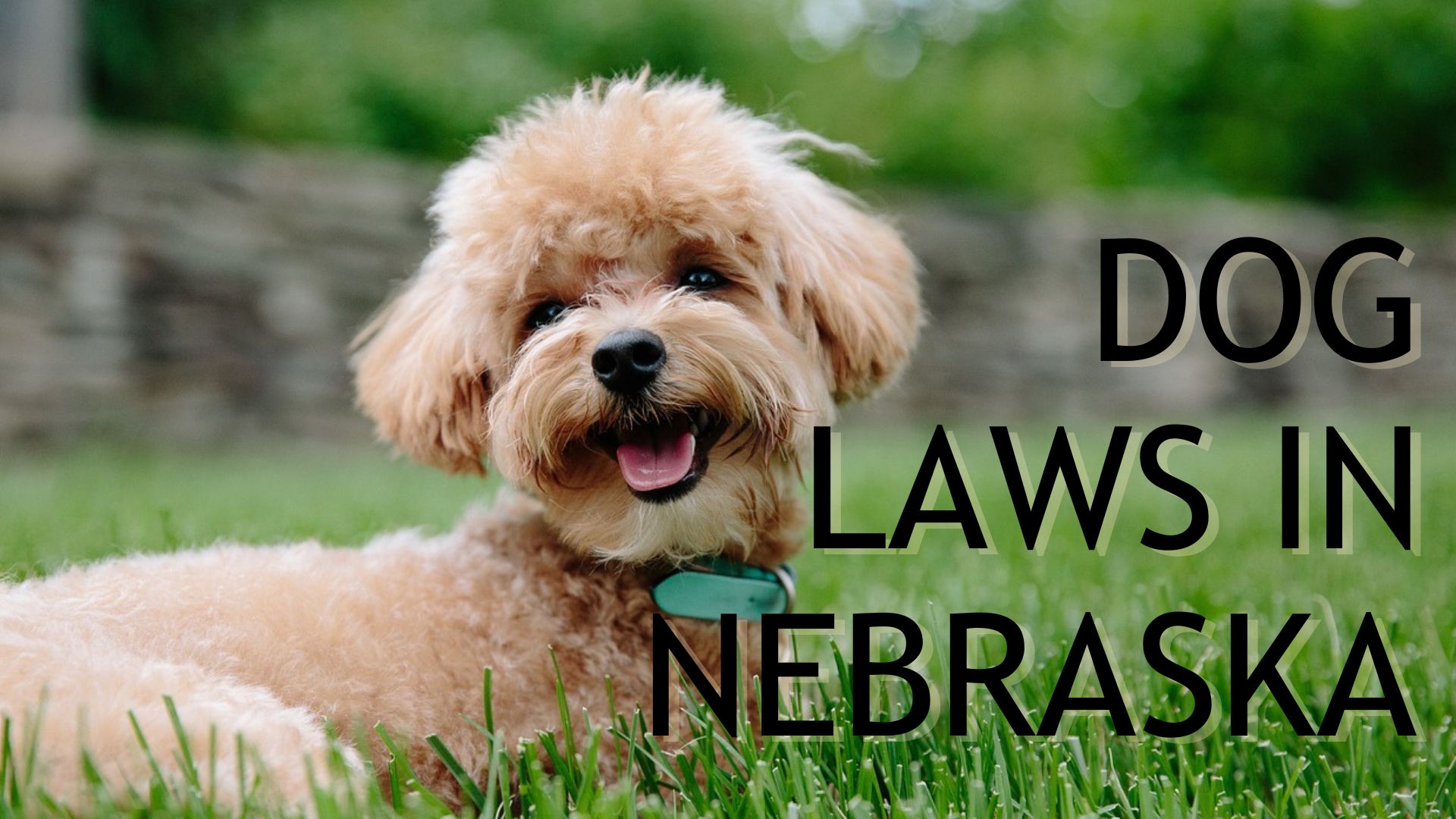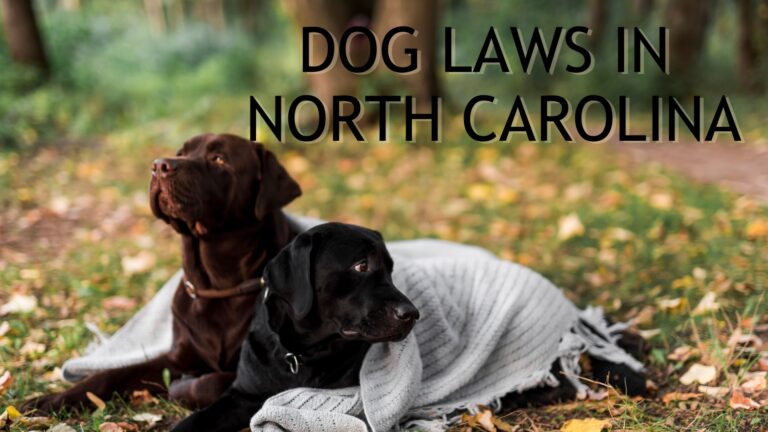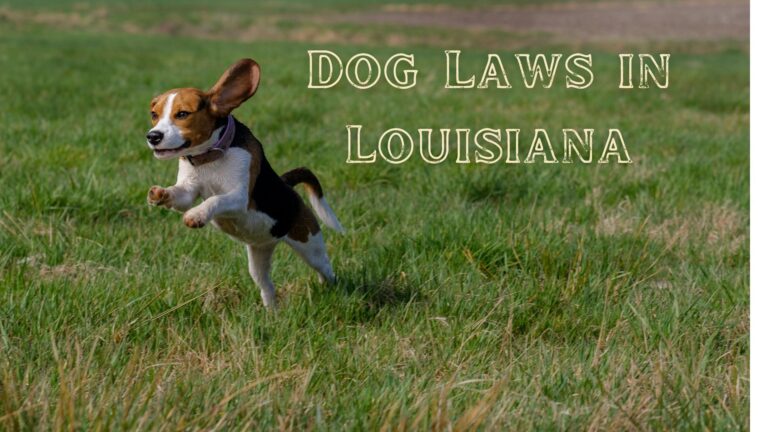Dog Laws in Nebraska
As a vet, I see countless canine companions coming through my doors every week, and with over 85 million dogs gracing American homes, it’s no surprise! But amidst all the tail wags and zoomies, there’s an important side of dog ownership that sometimes gets overlooked: understanding dog laws in your area.
Knowing these regulations isn’t just about avoiding fines, it’s about ensuring the safety and well-being of your furry friend and your community. Nebraska dog laws, for instance, cover everything from leash requirements and licensing to vaccination schedules and rules around dangerous breeds. By familiarizing yourself with these legalities, you can create a happy, healthy, and legal life for your pup!
Table of Contents
Dog Bite Laws in Nebraska
Owning a dog is a joy – unconditional love, furry companionship, endless entertainment (and maybe a chewed shoe or two). But with this privilege comes responsibility, especially when it comes to understanding dog bite laws in your state. Nebraska, like all states, has regulations in place to protect both people and dogs. Let’s delve into Nebraska’s dog bite laws to ensure tail wags, not lawsuits, define your dog ownership experience.

Why are Dog Bite Laws Important?
According to the Centers for Disease Control and Prevention (CDC), nearly 4.5 million dog bites occur annually in the United States. While most bites are minor, some can cause serious injuries. Dog bite laws establish a framework for determining liability in these situations, protecting victims and ensuring responsible dog ownership.
Nebraska’s Strict Liability Dog Bite Statute
Nebraska operates under a strict liability dog bite law, outlined in Nebraska Revised Statute 54-601. This means dog owners are generally liable for any injuries or damages their dog causes, regardless of prior knowledge of the dog’s aggressive tendencies.
Here’s a breakdown of the key aspects:
- Who is Liable? The owner(s) of the dog are held responsible.
- What is Covered? The law applies to injuries and damages caused by biting, wounding, injuring, worrying, or chasing of any person (other than a trespasser) or domestic animals.
- Does Prior Knowledge Matter? Generally, no. Nebraska is a strict liability state, so owners are liable even if they weren’t aware of their dog’s aggressive tendencies.
Exceptions to Strict Liability
While Nebraska’s law generally imposes strict liability, there are a few exceptions:
- Trespassing: If the person bitten was trespassing on the dog owner’s property at the time of the bite, the owner may not be liable.
- Provocation: If the victim intentionally provoked the dog, causing it to attack, the owner’s liability may be reduced or eliminated.
- Playful or Mischievous Behavior: This is the most complex exception. The law doesn’t apply if the dog’s actions were playful or mischievous. However, courts will consider the severity of the injury, the dog’s history, and witness statements to determine the dog’s intent.
What to Do After a Dog Bite
If you are bitten by a dog in Nebraska, here are the critical steps to take:
- Seek Medical Attention: This is your top priority. Get any injuries treated promptly to avoid infection and document the bite for potential legal action.
- Report the Bite: Contact animal control to report the bite. This helps track dog bite incidents and ensure the dog’s vaccinations are up-to-date.
- Document the Incident: Take photos of the bite wounds, the dog, and the scene of the incident. Gather witness statements if possible.
- Consider Legal Action: If you have sustained significant injuries, you may want to consult with an attorney specializing in dog bite cases. They can advise you on your legal options and help you navigate the claims process.
Additional Considerations
- Leash Laws: Nebraska has leash laws in place, requiring dogs to be leashed in public spaces. Following leash laws can help prevent dog bites and ensure your dog’s safety.
- Vaccination Requirements: Nebraska requires all dogs to be vaccinated against rabies. Up-to-date vaccinations are crucial for public health and can help minimize the risk of serious infections from dog bites.
- Dangerous Dog Laws: Nebraska has specific regulations for dangerous dogs. If your dog is deemed dangerous by animal control, you may face additional restrictions, such as mandatory muzzling or leash laws.
Remember: Responsible dog ownership is key to preventing dog bites. Socialize your dog early, train them properly, and keep them leashed in public spaces. By understanding Nebraska’s dog bite laws and following responsible ownership practices, you can create a safe and enjoyable environment for your furry friend and your community.
Dog Barking and Noise Laws in Nebraska
Living in Nebraska with your furry companion can be a dream come true. However, even the most adorable dog can become a source of frustration for neighbors if excessive barking disrupts the peace. Understanding Nebraska’s dog barking and noise laws is crucial for responsible pet ownership and maintaining harmonious relationships within your community.

Why Do Dogs Bark?
Before diving into legalities, let’s explore why dogs bark. Barking is a natural form of communication for dogs, used to express a variety of emotions and needs, including:
- Alerting: Dogs may bark to alert you or others to potential dangers, strangers approaching, or unusual noises.
- Fear or Anxiety: Feeling threatened, scared, or anxious can trigger barking in dogs.
- Boredom or Loneliness: Dogs left alone for extended periods can become bored and bark out of frustration or a desire for attention.
- Separation Anxiety: Some dogs experience anxiety when separated from their owners, leading to excessive barking.
- Medical Conditions: Certain medical conditions can cause vocalization in dogs, including pain, discomfort, or neurological issues.
Nebraska’s Noise Ordinances
While there’s no state-wide law specifically addressing dog barking in Nebraska, most cities and counties have noise ordinances that apply to animal noise, including barking. These ordinances typically define what constitutes excessive noise and set time restrictions. Here are some key points to remember:
- Focus on Reasonableness: Noise ordinances generally target unreasonable or excessive noise that disrupts the peace and tranquility of a neighborhood. Occasional barking isn’t usually a violation, but persistent barking for extended periods likely is.
- Time Restrictions: Many ordinances have designated quiet times when noise levels should be kept to a minimum. These times often fall during evenings and overnight hours.
- Decibel Limits: Some ordinances may specify decibel limits for noise, although this is less common for animal noise specifically.
Examples of City Ordinances
Here’s a glimpse into how some Nebraska cities address dog barking:
- Omaha: The Omaha Municipal Code Section 42-132 prohibits unreasonable noise from animals, including continuous or frequently repeated barking, howling, or yelping. The code empowers Animal Control to investigate complaints and issue citations.
- Lincoln: Lincoln’s Ordinance 6.04.435 defines “Barking Dog” as animal noise disturbing the peace. Animal Control follows a three-notice system, sending warnings to the dog owner before issuing citations.
- Grand Island: Grand Island’s Municipal Code Section 10-31 prohibits unreasonable noise from animals, including disturbing the peace with continuous or frequent barking. The code allows Animal Control to intervene and issue citations.
It’s important to note: These are just a few examples, and specific regulations will vary depending on your city or county. The best course of action is to find your municipality’s noise ordinance online or contact your local animal control office for details.
Addressing Excessive Dog Barking
If your dog’s barking is causing a nuisance, here are some steps you can take:
- Identify the Cause: Understanding why your dog barks is crucial. Is it boredom, anxiety, territoriality, or a medical issue? Addressing the root cause is key to curbing excessive barking.
- Training: Positive reinforcement training can help teach your dog appropriate ways to communicate instead of excessive barking.
- Enrichment Activities: Keep your dog mentally and physically stimulated with toys, games, and walks to reduce boredom-induced barking.
- Desensitization: If your dog barks at triggers like noises or people outside, gradual desensitization techniques can help them become less reactive.
- Consult a Veterinarian: If you suspect a medical reason behind the barking, consult your veterinarian for a check-up.
Remember: Patience and consistency are key when addressing excessive barking. Working with a qualified dog trainer can offer valuable guidance and techniques.
Preventing Barking Issues
Here are some proactive ways to prevent excessive barking from becoming a problem:
- Proper Socialization: Socialize your dog from a young age to different people, animals, and environments. This helps them become more confident and less likely to bark out of fear or anxiety.
- Desensitization Techniques: Gradually expose your dog to potential barking triggers in a controlled setting. This can help them become less reactive over time.
- Providing Enrichment: Keep your dog mentally and physically stimulated with regular walks, playtime, and interactive toys. A well-exercised and engaged dog is less likely to bark out of boredom.
Dog Poop Disposal Laws in Nebraska
Leaving your dog’s waste behind is not only inconsiderate, but it can also be a health hazard and a violation of local ordinances. Nebraska, like most states, prioritizes responsible pet ownership, and that includes proper dog poop disposal. This guide will equip you with the knowledge to be a responsible dog owner and keep Nebraska clean!

Why Proper Disposal Matters
Dog poop isn’t just unpleasant to step in; it can harbor harmful bacteria and parasites that pose a risk to human and animal health. When left on the ground, rain washes it into waterways, contaminating water sources. Proper disposal helps protect public health, the environment, and even your own dog’s health, as some parasites can be passed dog-to-dog through contact with infected feces.
Nebraska State Laws
While there’s no state-wide law specifically addressing dog poop disposal in Nebraska, Nebraska Revised Statute 54-2946 places the responsibility for animal waste disposal on the owner or custodian. This statute applies to any situation where an animal defecates, and the owner is liable for the cost of proper disposal if they fail to do so themselves.
Local Ordinances
Cities and counties in Nebraska have the authority to establish their own ordinances regarding pet waste disposal. These ordinances typically focus on:
- Required Disposal: Most ordinances mandate that dog owners pick up and dispose of their dog’s waste in a sanitary manner.
- Prohibited Areas: Some ordinances may designate specific areas where leaving dog waste is prohibited, such as parks, playgrounds, or public sidewalks.
- Fines for Violations: Failure to comply with dog waste disposal ordinances can result in fines for the dog owner.
Examples of City Ordinances
Here’s a glimpse into how some Nebraska cities address dog poop disposal:
- Omaha: Omaha Municipal Code Section 42-135 prohibits depositing animal waste on public or private property without the consent of the owner. The code requires owners to carry appropriate means for collection and disposal.
- Lincoln: Lincoln’s Ordinance 6.08.155 states that it’s unlawful for dog owners to leave feces on public property or private property of another unless placed in approved garbage containers. The ordinance also highlights the owner’s responsibility to keep their own premises free of offensive odors from pet waste.
- Grand Island: Grand Island’s Municipal Code Section 10-32 prohibits leaving animal waste on public or private property without the consent of the owner. The code requires dog owners to remove and dispose of the waste in a sanitary manner.
Finding Your Local Ordinance
The specific regulations on dog poop disposal will vary depending on your location in Nebraska. Here’s how to find your city or county’s ordinance:
- Municipal Website: Most city and county websites have sections dedicated to animal control or public health. These sections often detail relevant ordinances, including dog waste disposal regulations.
- Contact Animal Control: Your local animal control office is a valuable resource for information on pet waste disposal laws.
Responsible Dog Poop Disposal Practices
Here are some essential tips for responsible dog poop disposal:
- Always Carry Bags: Make it a habit to carry poop bags with you whenever you walk your dog. There are numerous options available, including biodegradable bags that are better for the environment.
- Pick Up Promptly: Don’t leave your dog’s waste behind. Pick it up immediately after your dog defecates.
- Dispose of Properly: Double-bag the waste and dispose of it in a designated trash receptacle. If no trash can is available, consider carrying the waste home for disposal.
- Respect Private Property: Never leave your dog’s waste on someone else’s property without their permission. Always clean up after your dog in parks, on trails, and sidewalks.
Benefits of Responsible Disposal
By following responsible dog poop disposal practices, you contribute to a cleaner and healthier environment for everyone. Here are some additional benefits:
- Prevents the Spread of Disease: Proper disposal minimizes the risk of transmitting harmful bacteria and parasites to humans and animals.
- Protects Water Quality: Dog waste can contaminate waterways when washed away by rain. Proper disposal helps safeguard clean water sources.
- Maintains Community Harmony: Leaving dog waste behind creates an unpleasant experience for everyone. Responsible disposal fosters a more pleasant and neighborly environment.
- Sets a Positive Example: By picking up after your dog, you encourage others to do the same, creating a ripple effect of responsible pet ownership.
Dog Licensing Laws in Nebraska
Owning a dog in Nebraska is a joy, but with that furry friend comes responsibility. One crucial aspect of responsible dog ownership is ensuring your pup is properly licensed. Dog licensing laws in Nebraska serve several vital purposes, from promoting public health to ensuring the safety and well-being of dogs themselves. Let’s delve into these laws and equip you with the knowledge to be a law-abiding dog owner in Nebraska.

Why Dog Licensing is Important
Dog licensing offers a multitude of benefits for both dogs and communities. Here’s a breakdown of the key reasons:
- Public Health Protection: Licensing helps track vaccination records, ensuring dogs are immunized against rabies, a potentially deadly disease.
- Lost Pet Recovery: A dog license tag plays a crucial role in reuniting lost dogs with their owners. It displays contact information, allowing animal control to quickly identify and return your furry friend.
- Funding for Animal Control: Licensing fees contribute to the funding of animal control services. These services include animal shelter operations, stray dog control, and enforcement of animal welfare laws.
- Responsible Pet Ownership: Obtaining a license demonstrates responsible pet ownership and your commitment to your dog’s well-being and community safety.
Nebraska Dog Licensing Laws
Nebraska operates under a county-by-county licensing system. This means specific regulations and fees may vary depending on your location. However, some general guidelines apply statewide:
- Licenses Required: All dogs four months of age or older residing in Nebraska must be licensed.
- Licensing Authority: Contact your local county treasurer’s office or animal control department to obtain a dog license.
- License Validity: In most cases, dog licenses are valid for one year. Renewal is typically required annually.
- Proof of Rabies Vaccination: A current rabies vaccination certificate is required for dog licensing.
Finding Your Local Ordinance
While the core principles remain consistent, specific details like licensing fees or late penalties may vary by county. Here’s how to find the exact regulations in your area:
- County Website: Most county websites have dedicated sections for animal control or public health. These sections often detail dog licensing requirements and fees.
- Contact your County Treasurer’s Office: The county treasurer’s office is responsible for issuing dog licenses. They can provide you with detailed information on fees, renewal deadlines, and the required paperwork.
Benefits of Dog Licensing
Beyond legal compliance, obtaining a license offers several benefits for you and your dog:
- Peace of Mind: Knowing your dog is properly licensed provides peace of mind. If your dog gets lost, a license tag significantly increases the chances of a successful reunion.
- Reduced Fees: Many animal shelters offer discounted adoption fees for licensed dogs.
- Protection for Your Dog: Licensed dogs are often prioritized by animal control during stray recovery efforts.
The Cost of Dog Licensing
The cost of dog licensing in Nebraska varies by county. Generally, fees are based on factors like:
- Dog’s Age: Neutered/Spayed dogs often have lower licensing fees than unaltered dogs.
- Location: Urban areas may have slightly higher licensing fees compared to rural counties.
Exemptions for Licensing
There are a few exceptions to Nebraska’s dog licensing requirements:
- Service Animals: Legally recognized service animals are exempt from licensing requirements. Proper documentation is required.
- Working Dogs: Working dogs used for specific purposes (e.g., herding dogs, hunting dogs) may be exempt or qualify for discounted licensing fees in some counties. Contact your local authorities for details.
Fines for Non-Compliance
Failure to license your dog in Nebraska can result in fines. These fines vary by county but can be significant. Some counties may also impound unlicensed dogs, adding further costs to reclaim your pet.
Responsible Pet Ownership Starts with Dog Licensing
Obtaining a dog license is a simple yet crucial step towards responsible pet ownership. By complying with licensing regulations, you’re not only following the law but also contributing to the well-being of your dog, maintaining public health, and ensuring a safe environment for your community. Remember, a licensed dog is a happy dog – happy for the walks, happy for the games, and most importantly, happy for the peace of mind knowing they’re home (and legal) with you.
Dog Leash Laws in Nebraska
Owning a dog in Nebraska means enjoying countless walks, tail wags, and furry companionship. But with this joy comes responsibility, and a crucial aspect of that is understanding and following dog leash laws. These laws exist to ensure the safety of both your dog and the community. Let’s explore the leash regulations in Nebraska and equip you to be a responsible dog owner who prioritizes everyone’s well-being.

Why Dog Leash Laws Matter
Dog leash laws aren’t just about keeping your pup under control; they serve several vital purposes:
- Public Safety: Leashes help prevent dog bites and attacks, protecting both people and other animals from potential harm. Unleashed dogs may chase joggers, cyclists, or even other dogs, creating unpredictable situations.
- Animal Control: Leashes make it easier for animal control officers to manage stray animals and reunite them with their owners. An unleashed dog is more likely to get lost or scared and wander away.
- Respecting Others: Not everyone feels comfortable around unleashed dogs. Leashes help maintain a sense of peace and respect for all users of public spaces.
- Protecting Your Dog: Leashes can keep your dog safe from hazards like traffic, aggressive animals, or encounters with wildlife.
Nebraska’s Dog Leash Laws
Nebraska operates under a county-by-county system for dog leash laws. This means specific regulations may vary depending on your location. However, some general principles apply statewide:
- Leash Requirement in Public Places: In most Nebraska counties, all dogs must be leashed when in public places like parks, sidewalks, trails, and public property. The leash length may vary by county, so it’s important to check local regulations.
- Exceptions: Some counties may have designated off-leash areas like dog parks where unleashed dogs can play under supervision. However, even in off-leash areas, responsible ownership practices are still essential.
Finding Your Local Leash Law
While the core principle of leashed dogs in public spaces remains consistent, details can vary by county. Here’s how to find the exact regulations in your area:
- County Website: Most county websites have dedicated sections for animal control or public health. These sections often detail dog leash laws and may even have downloadable resources.
- Contact your County Animal Control Department: Your local animal control department is a valuable resource for information on leash laws. They can provide details on specific leash length requirements, designated off-leash areas, and potential fines for non-compliance.
Responsible Leash Use
Beyond simply having your dog on a leash, responsible leash use is crucial:
- Choosing the Right Leash: Select a leash of appropriate length and strength for your dog’s size and temperament. A comfortable and secure leash ensures better control.
- Maintain Control: Always keep control of your dog while on a leash. Avoid distractions like texting while walking your dog and be prepared for potential triggers like other animals or noises.
- Clean Up After Your Dog: Leash laws don’t excuse you from responsible pet ownership. Always carry waste bags and dispose of your dog’s waste properly.
Benefits of Following Leash Laws
Following dog leash laws isn’t just about avoiding fines; it’s about promoting a safe and enjoyable environment for everyone:
- Peace of Mind: Knowing your dog is leashed provides peace of mind for you and others.
- Safety for All: Leashes significantly reduce the risk of dog bites and attacks, protecting people and other animals.
- Positive Experiences: Leashed dogs are less likely to create disturbances or frighten others, leading to more positive interactions in public spaces.
- Stronger Bond with Your Dog: Walking your dog on a leash provides an opportunity for training and bonding, strengthening your relationship with your furry friend.
Exceptions to Leash Laws
There are a few exceptions to dog leash laws in Nebraska:
- Private Property: With the property owner’s permission, your dog may be unleashed on private property. However, local ordinances regarding noise or nuisance may still apply.
- Service Animals: Legally recognized service animals are exempt from leash laws. These dogs are trained to perform specific tasks for individuals with disabilities.
- Hunting Dogs: During hunting seasons and in designated hunting areas, specific regulations may apply to hunting dogs. Contact your local wildlife agency for details.
Dangerous Dog Laws in Nebraska
Owning a dog is a joy, but it also comes with responsibility. Nebraska, like most states, has laws in place to address dangerous dogs, ensuring public safety while protecting the rights of responsible dog owners. Understanding these laws is crucial for owning any dog in Nebraska.

What is a Dangerous Dog in Nebraska?
Nebraska law doesn’t provide a single, universal definition of a “dangerous dog.” Instead, the designation is determined through a judicial process. Here’s how a dog might be deemed dangerous:
- History of Attacks: A dog with a documented history of inflicting serious injuries (beyond minor scratches) on people or other animals, unprovoked, is more likely to be declared dangerous.
- Threatening Behavior: Dogs exhibiting aggressive behavior that poses a serious threat of harm, such as growling, snapping, or chasing in a menacing way, may be considered dangerous.
- Breed Specificity: While Nebraska doesn’t have breed-specific bans, some breeds may be considered inherently dangerous based on past incidents or public perception. However, the judge will consider the dog’s individual behavior as the primary factor.
The Dangerous Dog Designation Process
The process of declaring a dog dangerous typically involves the following steps:
- Incident Report: If a dog attacks or threatens someone (excluding trespassers or people provoking the dog), an incident report is usually filed with animal control.
- Investigation: Animal control will investigate the incident, gathering evidence and witness statements.
- Hearing: In some cases, a hearing may be held to determine if the dog should be declared dangerous. This hearing may involve testimony from animal control officers, witnesses, and potentially a veterinarian.
- Judge’s Decision: If the judge determines the dog poses a serious threat, they may declare it dangerous and impose specific restrictions.
Restrictions on Dangerous Dogs
If your dog is declared dangerous in Nebraska, you can expect the following restrictions:
- Muzzling: Your dog may be required to wear a secure muzzle in public spaces at all times.
- Leash and Enclosure: Leash laws may become stricter, requiring a strong leash and a secure enclosure on your property to contain the dog.
- Financial Responsibility: You may be held financially liable for any future injuries or damages caused by your dog.
- Liability Insurance: The court may mandate that you obtain liability insurance for your dog to cover potential damages.
- Training Requirements: The court might order you to enroll your dog in obedience training or behavior modification programs.
Important Considerations
- Appealing the Decision: If you disagree with a dangerous dog designation, you may have the right to appeal the decision. An attorney can advise you on the appeals process.
- Relocation: Some communities may have restrictions on owning dangerous dogs within city limits. If your dog is declared dangerous, relocation might be necessary.
- Euthanasia: In extreme cases, if the court deems the dog a serious threat to public safety, euthanasia may be considered as a last resort.
Preventing Dangerous Dog Situations
The best way to avoid dealing with dangerous dog laws is to be a responsible dog owner. Here are some proactive tips:
- Socialization & Training: Start socializing your dog from a young age to ensure they’re comfortable with different people, animals, and environments. Regular training helps establish control and obedience.
- Responsible Breeding Practices: If you’re considering breeding your dog, research responsible breeding practices to ensure good temperament in offspring.
- Spay/Neuter: Spaying or neutering your dog can reduce aggressive tendencies in some cases.
- Recognize Warning Signs: Be aware of potential triggers for aggression in your dog, such as fear, anxiety, or resource guarding. Address these issues through training and behavior modification techniques.
- Supervision: Never leave your dog unsupervised around children or other animals, especially when young or unfamiliar with each other.
Dog Health and Welfare Laws in Nebraska
Owning a dog in Nebraska isn’t just about walks and playtime; it’s about providing a loving home that prioritizes their health and well-being. Nebraska, like most states, has a framework of laws to ensure the humane treatment of animals, including specific regulations focused on dog health and welfare. Understanding these laws empowers you to be a responsible dog owner and safeguard your furry friend’s happiness and well-being.

Nebraska’s Animal Welfare Laws
Nebraska’s animal welfare laws are primarily outlined in Nebraska Revised Statutes Title 54, specifically Chapter 6, which addresses cruelty to animals. These laws encompass a broad range of actions that constitute animal cruelty, including:
- Abandonment: Leaving an animal without providing adequate food, water, or shelter is a crime in Nebraska.
- Neglect: Failing to provide proper nutrition, veterinary care, or a safe environment for your dog constitutes neglect and is illegal.
- Physical Abuse: Any intentional act that inflicts unnecessary pain or suffering on a dog is considered animal cruelty.
- Fighting or Baiting: Organizing or participating in dog fighting or using dogs as bait for other animals is a felony in Nebraska.
Enforcing Animal Welfare Laws
Nebraska’s animal welfare laws are enforced by various entities:
- Law Enforcement: Police officers and animal control officers have the authority to investigate suspected animal cruelty cases.
- Humane Societies: Non-profit organizations like the Nebraska Humane Society can play a role in investigating and reporting animal cruelty.
- Citizens: Anyone who witnesses or suspects animal cruelty has a responsibility to report it to the appropriate authorities.
Reporting Animal Cruelty
If you suspect a dog is being mistreated in Nebraska, here’s what you can do:
- Contact Your Local Animal Control: They are equipped to investigate potential animal cruelty and take necessary action.
- Report to a Humane Society: Organizations like the Nebraska Humane Society have experience handling animal cruelty cases and can offer guidance.
- Call the Nebraska Attorney General’s Office: The Attorney General’s Office has a consumer protection division that handles animal cruelty complaints.
Additional Protections for Dog Health
Beyond general animal cruelty laws, Nebraska has specific regulations focused on dog health and welfare:
- Rabies Vaccination: All dogs four months of age or older in Nebraska must be vaccinated against rabies by a licensed veterinarian. Vaccination records are required for dog licensing.
- Tethering Restrictions: Some Nebraska cities and counties have ordinances restricting the tethering of dogs outdoors for extended periods. These ordinances typically focus on duration, access to shelter, and weather conditions.
- Commercial Breeding: Nebraska regulates commercial dog breeding operations through the Commercial Dog and Cat Operator Inspection Act. This act sets standards for housing, sanitation, veterinary care, and recordkeeping for breeding dogs.
Finding Local Animal Welfare Ordinances
While Nebraska has a statewide framework for animal cruelty, some cities and counties may have additional ordinances specific to dog health and welfare. Here’s how to find those local regulations:
- Municipal Website: Many city and county websites have sections dedicated to animal control or public health. These sections often detail local animal welfare ordinances.
- Contact Your Local Animal Control Department: The animal control department can provide information on specific ordinances in your area.
Responsible Dog Ownership
Animal welfare laws provide a baseline for dog care, but responsible ownership goes beyond just following the law. Consider these additional practices:
- Provide Quality Food and Water: Ensure your dog receives a balanced diet appropriate for their age and activity level. Always provide fresh, clean water.
- Regular Veterinary Care: Schedule regular checkups with a veterinarian for preventive care, vaccinations, and early detection of potential health issues.
- Exercise and Enrichment: Provide your dog with daily exercise to stay physically and mentally stimulated. Offer enrichment activities like toys, games, and training to prevent boredom and destructive behaviors.
- Safe and Secure Environment: Ensure your dog has a safe and secure environment, both indoors and outdoors. This includes proper fencing, shelter from extreme weather, and identification tags in case they get lost.
Dog Public Access Laws in Nebraska
Owning a dog in Nebraska enriches your life with companionship, adventure, and furry friendship. But venturing out with your canine companion involves understanding the legalities of where they can and can’t go. Nebraska, like many states, has a framework of public access laws for dogs, balancing the joy of bringing your dog along with the rights of others. Let’s explore these laws and ensure responsible doggy outings in Nebraska.

The Nuance of Public Access Laws
There isn’t a single, state-wide law governing dog public access in Nebraska. Instead, the regulations are determined by a combination of factors:
- State Statutes: Nebraska Revised Statutes provide some general guidelines, like requiring dogs to be leashed in public places.
- County Ordinances: Individual counties have the authority to enact their own ordinances regarding dog access in specific public areas like parks, trails, or public buildings.
- Business Policies: Private businesses have the right to establish their own policies on allowing dogs on their premises.
Understanding Leash Laws
Nebraska operates under a county-by-county system for leash laws. Here’s a breakdown of what to expect:
- Leash Requirement in Public Places: In most Nebraska counties, all dogs must be leashed when in public places like parks, sidewalks, and public property. The leash length may vary by county, so it’s crucial to check local regulations.
- Designated Off-Leash Areas: Some counties may have designated off-leash areas like dog parks where unleashed dogs can play under supervision. However, responsible ownership practices still apply in these areas, like maintaining control and cleaning up after your dog.
Finding Local Public Access Regulations
With regulations varying by county and business, here’s how to navigate dog public access in Nebraska:
- County Website: Most county websites have dedicated sections for animal control or public health. These sections often detail leash laws, designated off-leash areas, and access restrictions in specific public spaces.
- Contact Your County Animal Control Department: Your local animal control department is a valuable resource for information on leash laws and public access regulations in your area.
- Business Websites or Signage: Many businesses will display signs or have information on their websites regarding their policy on allowing dogs on their premises.
Respecting Public Access Restrictions
Even dog-loving communities have regulations to ensure everyone can enjoy public spaces safely and comfortably. Here’s how to be a responsible dog owner when venturing out:
- Leash Your Dog in Designated Areas: Always leash your dog in areas where required by county ordinance. A leash provides control and prevents disruptions to others.
- Respect Off-Leash Area Rules: Even in designated off-leash areas, ensure your dog’s behavior is appropriate. If they’re exhibiting aggression or causing issues, leash them up.
- Clean Up After Your Dog: Regardless of location, responsible dog ownership means picking up after your dog’s waste. Always carry waste bags and dispose of waste properly.
- Be Aware of Others: Not everyone enjoys being around dogs. Be mindful of others using the space and give them space if needed. If your dog shows excessive barking or reactivity, it might be best to visit another location.
Public Buildings and Services
While leash laws primarily focus on outdoor public spaces, access for dogs in public buildings and services can vary:
- Government Buildings: Access for dogs in government buildings is generally restricted, with exceptions for service animals.
- Libraries: Some libraries may allow well-behaved dogs on a leash, while others may have restrictions. It’s best to check their policy beforehand.
- Restaurants and Retail Stores: Private businesses determine their policies on dogs. Look for signage or contact the business directly to inquire about their dog policy.
Public Transportation and Dog Travel
Nebraska public transportation options, like buses, typically don’t allow pets unless they are qualified service animals. However, some ridesharing services may offer pet-friendly options. Always check with the specific service provider regarding their pet policies.
Benefits of Responsible Public Access
Following public access regulations isn’t just about avoiding fines; it promotes a positive experience for everyone:
- Harmony in Public Spaces: Following leash laws and respecting access restrictions ensures everyone can enjoy public spaces safely and comfortably.
- Promoting Dog-Friendly Communities: Responsible dog owners contribute to a more welcoming environment for dogs in businesses and public spaces.
- Exercise and Enrichment for Dogs: Bringing your dog along on errands or outings provides opportunities for exercise, socialization, and mental stimulation.
Dog Travel and Transportation Laws in Nebraska
Nebraska offers stunning landscapes, charming towns, and exciting adventures, perfect for exploring with your furry companion. But before you hit the road, ensure your furry friend travels safely and legally by understanding Nebraska’s dog travel and transportation laws. This guide equips you with the knowledge to plan a smooth and stress-free journey with your canine co-pilot.

Planning for Safe Dog Travel
Here are some crucial considerations for safe dog travel:
- Vaccinations: Ensure your dog is up-to-date on all vaccinations required for travel. Rabies vaccination is mandatory in Nebraska, and other vaccinations may be necessary depending on your destination.
- Health Certificate: Some states or travel providers may require a health certificate from a licensed veterinarian certifying your dog’s good health within a specific timeframe before travel.
- Identification: Always make sure your dog has a collar with a visible ID tag containing your contact information. Consider microchipping your dog for additional identification security.
- Travel Crate or Carrier: Choose a secure and comfortable travel crate or carrier appropriate for your dog’s size. Train them to feel comfortable inside the crate to minimize stress during the journey.
Traveling by Car with Your Dog
Nebraska doesn’t have specific laws mandating how to transport dogs in vehicles. However, prioritizing your dog’s safety and comfort is essential. Here are some best practices:
- Secure Your Dog: Never allow your dog to roam freely in the car. Use a crate, harness with a tether, or a pet barrier to prevent them from becoming a projectile in case of a sudden stop.
- Temperature Control: Maintain a comfortable temperature inside the car for your dog. Avoid leaving them unattended in extreme heat or cold. Take frequent breaks to allow them to relieve themselves and get fresh air.
- Hydration: Ensure your dog has access to fresh water throughout the journey. Bring a portable water bowl and stop regularly for water breaks.
- Motion Sickness: If your dog is prone to motion sickness, consult your veterinarian for advice on medication or calming techniques.
Traveling by Plane with Your Dog
Airlines have varying policies regarding pet travel. Here’s a general overview:
- Size and Breed Restrictions: Some airlines have size and breed restrictions for pets traveling in the cabin. Larger dogs typically need to travel as checked baggage.
- Pet Fees: Airlines charge pet fees for transporting dogs. Fees vary depending on the airline, the size of your dog, and whether they travel in the cabin or as checked baggage.
- Airline Requirements: Airlines have specific requirements for pet carriers, health certificates, and documentation. Always contact the airline directly to understand their current pet travel policies.
Traveling by Train with Your Dog
Amtrak, the national passenger railroad service, does not currently allow pets on board their trains, with limited exceptions for service animals.
Public Transportation and Dog Travel
Nebraska public transportation options, like buses, typically don’t allow pets unless they are qualified service animals. However, some ridesharing services may offer pet-friendly options. Always check with the specific service provider regarding their pet policies.
Traveling with Your Dog Across State Lines
When traveling across state lines, additional regulations may apply. Here’s what to consider:
- Vaccinations: Some states may have specific vaccination requirements for incoming dogs. Research your destination’s regulations to ensure your dog meets all vaccination requirements.
- Health Certificates: Certain states might require a health certificate from a licensed veterinarian issued within a specific timeframe before your dog’s arrival.
Finding Travel Regulations
Staying informed about current travel regulations is crucial. Here are resources to help you:
- Nebraska Department of Agriculture: The Nebraska Department of Agriculture website may have information on pet travel requirements within the state.
- U.S. Department of Agriculture (USDA) Animal and Plant Health Inspection Service (APHIS): The USDA APHIS website provides information on pet travel regulations across state lines, including a handy tool to find specific requirements by destination.
- Airline Websites: Airlines have dedicated sections on their websites outlining their pet travel policies and requirements.
Dog Housing and Accommodation Laws in Nebraska
Owning a dog in Nebraska brings joy, companionship, and sometimes, the need for travel or temporary housing situations. But finding dog-friendly accommodations can be tricky. This guide explores Nebraska’s dog housing and accommodation laws, equipping you to navigate renting with a dog and ensure your furry friend has a comfortable stay.

The Landscape of Dog Housing Laws
There isn’t a single, overarching law governing dog housing and accommodation in Nebraska. Here’s a breakdown of the key factors at play:
- Fair Housing Act (FHA): This federal law prohibits discrimination based on disability. In some cases, it protects tenants with disabilities who require service animals to have reasonable accommodations in housing, even if the property has a “no-pet” policy.
- Nebraska Fair Housing Act: Nebraska’s Fair Housing Act mirrors the federal FHA and offers similar protections for tenants with disabilities and service animals.
- Local Ordinances: Some cities and counties in Nebraska may have ordinances related to dog ownership in multi-unit housing, such as breed restrictions or limitations on the number of pets per unit.
- Landlord Policies: Ultimately, landlords have the right to establish their own pet policies, as long as they comply with fair housing laws regarding service animals.
Understanding Service Animals vs. Pets
The Fair Housing Act (FHA) plays a crucial role in dog housing and accommodation. However, it’s important to distinguish between service animals and pets:
- Service Animal: The FHA defines a service animal as a dog that is individually trained to do work or perform tasks for the benefit of a person with a disability. This includes tasks like guiding the blind, alerting to seizures, or providing emotional support.
- Pet: A pet, including a dog, provides companionship but doesn’t perform specific disability-related tasks.
Rights and Responsibilities Under the FHA
The FHA grants certain rights and responsibilities to tenants with disabilities and landlords:
- Tenant Rights: Tenants with disabilities who require a service animal have the right to live in a pet-free housing unit and cannot be denied housing based on their service animal.
- Landlord Responsibilities: Landlords cannot enforce “no-pet” policies against tenants with service animals. They also cannot charge additional pet fees or deposits for service animals. However, landlords can require proof that the animal is a qualified service animal and can hold tenants responsible for any damage caused by their service animal.
Navigating “No-Pet” Policies
If you have a service animal and encounter a “no-pet” policy, here’s what you can do:
- Provide Documentation: Be prepared to provide documentation from a licensed healthcare professional verifying your disability and explaining how your service animal alleviates your disability.
- Engage in a Reasonable Conversation: Discuss your needs with the landlord and explain how your service animal improves your quality of life.
- Seek Legal Support: If you face discrimination based on your service animal, you may want to seek legal advice from an attorney specializing in fair housing law.
Finding Dog-Friendly Rentals
While the FHA protects tenants with service animals, finding dog-friendly rentals for pets can be more challenging. Here are some tips:
- Search for Pet-Friendly Rentals: Many rental websites have filters for pet-friendly properties. Utilize these filters and search specifically for dog-friendly listings.
- Contact Landlords Directly: Inquire about pet policies even if the listing doesn’t explicitly mention dogs. Some landlords may be open to well-behaved pets on a case-by-case basis.
- Offer References: Provide references from previous landlords who can vouch for your responsible pet ownership.
- Consider Breed Restrictions: Some landlords may have breed restrictions based on insurance or property damage concerns. Be aware of these restrictions and adjust your search accordingly.
Additional Considerations for Dog Housing
Here are some additional factors to consider when finding dog-friendly housing:
- Size and Breed: Landlords may have limitations on the size or breed of dogs allowed in their properties.
- Number of Pets: There may be restrictions on the total number of pets allowed per unit.
- Pet Fees and Deposits: Landlords may charge additional fees or deposits for pet owners, even if the pet is not a service animal.
Dog Adoption and Sale Laws in Nebraska
Bringing a dog into your life is a big decision, filled with wags, wet noses, and unconditional love. Whether you’re considering adopting a dog in need of a second chance or purchasing a puppy from a breeder, understanding Nebraska’s adoption and sale laws is crucial. This guide equips you with the knowledge to make informed choices and ensure a smooth, legal transition for your furry friend.

The Landscape of Dog Adoption and Sale Laws
Nebraska doesn’t have a single, comprehensive law governing dog adoption and sale. Regulations are addressed through a combination of:
- Nebraska Revised Statutes: These outline general animal welfare laws that apply to both shelters and breeders.
- Local Ordinances: Cities and counties may have additional ordinances specific to animal shelters, commercial breeding operations, or pet stores selling dogs.
Adopting a Dog in Nebraska
Many wonderful dogs in Nebraska shelters and rescue organizations are waiting for loving homes. Here’s what to know about adopting a dog in Nebraska:
- Adoption Process: The adoption process typically involves filling out an application, meeting potential canine companions, and undergoing a home check to ensure a suitable environment.
- Adoption Fees: Shelters and rescues often charge adoption fees to cover the costs of caring for the animals, including vaccinations, spaying/neutering, and microchipping.
- Animal Welfare Laws: Nebraska Revised Statutes Chapter 54, specifically Section 6, outlines animal cruelty laws that apply to shelters and rescues. These laws ensure the humane treatment of animals awaiting adoption.
Finding Reputable Shelters and Rescues
Finding a reputable shelter or rescue organization is crucial for a positive adoption experience. Here are some tips:
- Ask for Recommendations: Talk to friends, family, or your veterinarian for recommendations on reputable shelters or rescues in your area.
- Research Online: Many shelters and rescues have websites or social media pages showcasing adoptable dogs and their adoption process.
- Look for Accreditation: Consider shelters or rescues accredited by organizations like the Association of Shelter Veterinarians (ASV) or the American Society for the Prevention of Cruelty to Animals (ASPCA).
Purchasing a Dog from a Breeder in Nebraska
If you’re looking for a specific breed, purchasing a puppy from a responsible breeder may be the right choice. Here’s what to understand about buying a dog from a breeder in Nebraska:
- Nebraska Commercial Dog and Cat Operator Inspection Act: This act regulates commercial dog breeding operations in Nebraska. It sets standards for housing, sanitation, veterinary care, and recordkeeping for breeding dogs.
- Breeder Requirements: Licensed breeders must comply with specific requirements, including regular inspections, proper animal care, and accurate recordkeeping of breeding stock and litters.
- Consumer Protections: The Nebraska Attorney General’s Consumer Protection Division offers resources and information on protecting yourself when purchasing a dog from a breeder.
Finding Reputable Dog Breeders
Finding a reputable breeder who prioritizes the health and well-being of their dogs is essential. Here are some tips for choosing a responsible breeder:
- Ask for Recommendations: Talk to veterinarians, breed clubs, or dog show organizers for recommendations on reputable breeders of your chosen breed.
- Research the Breed: Understand the specific needs and potential health concerns of the breed you’re interested in.
- Visit the Breeder’s Facility: Schedule a visit to the breeder’s facility to assess the conditions in which the dogs are kept and meet the parents of the puppies.
- Ask Questions: Don’t hesitate to ask questions about the breeder’s breeding practices, health testing, and temperament of the dogs.
Nebraska Laws You Should Know
While there isn’t a single law governing dog adoption and sale, here are some specific Nebraska statutes to be aware of:
- Prohibition on Selling Puppies Under 8 Weeks Old: Nebraska Revised Statutes Section 28-1018 prohibits selling puppies or kittens under eight weeks of age without their mother present.
- Dog and Cat Purchase Protection Act: This act outlines requirements for commercial sellers of dogs and cats, including written disclosures about the pet’s health history, guarantees on vaccinations and spaying/neutering, and a cooling-off period for buyers.
Dog Park and Recreation Laws in Nebraska
Nebraska boasts stunning landscapes and vibrant communities, perfect for exploring with your furry companion. But venturing out with your canine friend requires understanding the legalities of dog parks and recreational areas. This guide explores Nebraska’s dog park and recreation laws, empowering you to enjoy safe and responsible outings with your dog.

The Landscape of Dog Park and Recreation Laws
There isn’t a single, state-wide law governing dog parks and recreation areas in Nebraska. Regulations are determined by a combination of factors:
- Nebraska Revised Statutes: These outline general leash laws and animal control regulations that apply to public spaces.
- County Ordinances: Individual counties have the authority to establish ordinances for off-leash areas and specific rules within dog parks situated within their jurisdiction.
- City Ordinances: Many cities within Nebraska have designated dog parks and may have their own ordinances detailing park rules and access restrictions.
- Park Management Policies: Individual dog parks may have additional rules established by the managing entity, which could be a city park department, non-profit organization, or private company.
Understanding Leash Laws and Off-Leash Areas
Nebraska operates under a county-by-county system for leash laws. Here’s a breakdown of what to expect:
- Leash Requirement in Public Places: In most Nebraska counties, all dogs must be leashed when in public places like parks, sidewalks, and public property. The leash length may vary by county, so it’s crucial to check local regulations.
- Designated Off-Leash Areas: Some counties may have designated off-leash areas like dog parks where unleashed dogs can play under supervision. However, responsible ownership practices still apply in these areas, like maintaining control and cleaning up after your dog.
Finding Local Dog Park Regulations
With regulations varying by county, city, and park management, here’s how to navigate dog park access and rules in Nebraska:
- County Website: Most county websites have dedicated sections for animal control or public health. These sections often detail county leash laws, designated off-leash areas, and access restrictions in specific public spaces, including dog parks.
- City Website: Many cities with dog parks provide information on their websites, outlining park rules, access requirements, and amenities.
- Contact Your Local Animal Control Department: Your local animal control department is a valuable resource for information on leash laws, dog park locations, and specific regulations within your area.
- Park Signage: Most dog parks will have signage displayed at the entrance outlining the park’s rules and etiquette.
Responsible Dog Park Etiquette
Dog parks offer a chance for your dog to socialize, exercise, and burn off energy. Here’s how to be a responsible dog park patron:
- Only Use Designated Off-Leash Areas: Ensure your dog is in a designated off-leash area before allowing them to run freely. Respect leash laws in other public spaces.
- Vaccinations and Health: Only bring dogs who are up-to-date on all vaccinations to protect other canine companions. Avoid bringing sick dogs to the park.
- Supervise Your Dog at All Times: Never leave your dog unattended at the dog park. Maintain close supervision and control your dog’s interactions with other animals and people.
- Clean Up After Your Dog: Always carry waste bags and dispose of your dog’s waste properly. Leaving waste behind is disrespectful and unsanitary.
- Be Aware of Your Dog’s Behavior: If your dog becomes aggressive, overly reactive, or displays disruptive behavior, leash them immediately and remove them from the park.
Additional Considerations for Dog Parks
Beyond etiquette, here are some additional factors to consider when using dog parks:
- Size Considerations: Some dog parks may have separate areas for small and large dogs to ensure safety and minimize potential conflicts.
- Park Rules and Amenities: Review the park’s specific rules regarding items allowed in the park (toys, treats) and any restrictions on breeds or age of dogs.
- Socialization and Training: Dog parks are great for socialization, but ensure your dog has basic obedience training before venturing out.
Alternative Dog Recreation Options
While dog parks offer a designated space for off-leash play, Nebraska offers other dog-friendly recreation options:
- Hiking Trails: Many Nebraska trails allow well-behaved dogs on leash. Research trail regulations before heading out and ensure your dog is comfortable with leash walking.
- State Parks: Some Nebraska state parks permit leashed dogs on designated trails and campgrounds. Always check the specific park’s rules before visiting.
Dog Food and Nutrition Laws in Nebraska
Providing your furry friend with a healthy and balanced diet is crucial for their overall well-being. Understanding dog food and nutrition regulations in Nebraska empowers you to make informed choices about your dog’s meals. Here’s a comprehensive guide to navigate this topic.

The Landscape of Dog Food and Nutrition Laws
While Nebraska doesn’t have specific laws directly regulating dog food ingredients or labeling, the regulations fall under the umbrella of federal oversight. Here’s a breakdown of the key players:
- Food and Drug Administration (FDA): The FDA is the primary federal agency responsible for ensuring the safety, wholesomeness, and labeling of pet food sold in the United States. They set guidelines for labeling requirements, investigate pet food complaints, and work with manufacturers to ensure product safety.
- Association of American Feed Control Officials (AAFCO): The AAFCO is a non-governmental organization that establishes model regulations and guidelines for pet food labeling and nutrient profiles. While not a legal requirement, most pet food manufacturers adhere to AAFCO guidelines.
Understanding Dog Food Labels
Knowing how to read dog food labels is essential for making informed choices about your dog’s nutrition. Here’s a breakdown of key components on a dog food label:
- Product Name and Brand: This identifies the product and manufacturer.
- Guaranteed Analysis: This section lists the minimum guaranteed percentages of protein, fat, fiber, and moisture content in the food.
- List of Ingredients: Ingredients are listed in descending order by weight, with the first ingredient being the most prominent.
- Nutritional Adequacy Statement: This statement indicates whether the food meets the nutritional requirements for a specific life stage (puppy, adult, senior) as established by AAFCO.
- Feeding Guidelines: These guidelines offer a starting point for feeding amounts based on your dog’s weight and activity level.
Choosing the Right Dog Food for Your Canine Companion
Several factors influence the right dog food for your furry friend:
- Age and Life Stage: Puppies, adults, and senior dogs have different nutritional needs. Choose a food formulated for your dog’s specific life stage.
- Breed: Certain breeds may have specific dietary requirements due to size, activity level, or potential health concerns.
- Activity Level: Highly active dogs may require food with higher calorie content to support their energy needs.
- Health Considerations: If your dog has any health issues, discuss dietary needs with your veterinarian and choose a food that supports their specific condition.
Sourcing and Quality
While the FDA and AAFCO play a role in pet food safety, some dog owners are concerned about the sourcing and quality of ingredients in commercially available dog food. Here are some considerations:
- AAFCO Ingredient Categories: AAFCO uses broad categories for ingredients like “poultry by-product meal” or “meat and bone meal.” These terms don’t specify the exact source of the protein.
- Human-Grade vs. Pet-Grade Ingredients: There’s no legal definition of “human-grade” for pet food. However, some pet food manufacturers focus on using ingredients fit for human consumption.
- Whole Foods vs. Processed Foods: Some dog owners prefer whole food diets made with fresh, unprocessed ingredients.
Consulting Your Veterinarian
Your veterinarian is your best resource for guidance on your dog’s specific nutritional needs. They can help you:
- Interpret Dog Food Labels: Your veterinarian can explain the nutritional information on a dog food label and its relevance to your dog’s health.
- Address Health Concerns: If your dog has any health issues, your veterinarian can recommend a specialized diet to support their specific needs.
- Recommend Brands or Formulations: While veterinarians cannot endorse specific brands, they can offer guidance on types of food suitable for your dog’s age, breed, and activity level.
Additional Resources for Dog Nutrition
Here are some additional resources to learn more about dog food and nutrition:
- Association of American Feed Control Officials (AAFCO): The AAFCO website provides information on pet food labeling regulations and nutritional profiles.
- World Small Animal Veterinary Association (WSAVA): The WSAVA website provides information sheets on various pet health topics, including pet nutrition.
- Pet Food Manufacturers’ Websites: Many pet food manufacturers offer detailed information on their products’ ingredients and nutritional profiles on their websites.
Dog Health and Veterinary Care Laws in Nebraska
Providing your furry friend with proper veterinary care is essential for a long and happy life. Understanding Nebraska’s dog health and veterinary care laws empowers you to make informed decisions about your dog’s well-being. This guide explores the legal landscape and equips you with resources to ensure your dog receives the care they deserve.

The Landscape of Dog Health and Veterinary Care Laws
Nebraska doesn’t have specific laws mandating veterinary care for all dogs. However, there are regulations related to:
- Veterinary Practice: The Nebraska Veterinary Medicine and Surgery Practice Act governs the licensing and practice of veterinary medicine in the state.
- Animal Welfare: Nebraska Revised Statutes Chapter 54 outlines general animal cruelty laws that apply to pet owners.
- Rabies Vaccination: Nebraska law mandates rabies vaccination for all dogs over four months of age.
Nebraska Veterinary Medicine and Surgery Practice Act
This act ensures qualified professionals provide veterinary care to animals in Nebraska. Here are some key points:
- Veterinary Licensing: Only licensed veterinarians can diagnose and treat animal health conditions, perform surgeries, or prescribe medications in Nebraska.
- Veterinary Technician Licensing: Licensed veterinary technicians can assist veterinarians with specific tasks under their direct supervision.
- Animal Therapist Licensing: The act also outlines licensing requirements for animal therapists who provide alternative therapies to animals.
Ensuring Responsible Pet Ownership: Animal Cruelty Laws
Nebraska Revised Statutes Section 54 outlines animal cruelty laws. These laws define cruelty and neglect and establish penalties for violations. Here’s what constitutes animal cruelty in Nebraska:
- Failing to provide necessary food, water, or shelter
- Inflicting unnecessary pain or suffering
- Abandoning an animal
- Transporting an animal in a cruel or inhumane manner
Rabies Vaccination Requirements
Nebraska law mandates rabies vaccination for all dogs over four months of age. Here’s a breakdown of the regulations:
- Initial Vaccination: Puppies must be vaccinated for rabies at or around four months of age.
- Booster Vaccinations: Rabies vaccinations require boosters at specific intervals, typically every one or three years depending on the vaccine used.
- Vaccination Documentation: Dog owners are required to keep proof of current rabies vaccination for their dogs.
Finding a Licensed Veterinarian in Nebraska
The Nebraska Board of Veterinary Medicine website provides a searchable database of licensed veterinarians in the state. This allows you to find a qualified professional near you.
Understanding the Cost of Veterinary Care
Veterinary care costs can vary depending on factors like location, the type of service needed, and the complexity of your dog’s health issue. Here are some ways to manage veterinary care costs:
- Pet Insurance: Consider pet insurance to help offset the financial burden of unexpected veterinary expenses.
- Preventative Care: Regular checkups and preventive care can help identify potential health issues early, potentially saving money on treatment costs in the long run.
- Veterinary Payment Plans: Some veterinary clinics offer payment plans to help manage the cost of veterinary care.
- Financial Assistance Programs: Some organizations offer financial assistance programs to help pet owners who struggle to afford veterinary care.
Additional Resources for Dog Health
Here are some valuable resources to learn more about dog health and veterinary care:
- American Veterinary Medical Association (AVMA): The AVMA website offers a wealth of information on pet health topics, including vaccination recommendations and responsible pet ownership. (
- Nebraska Humane Society: The Nebraska Humane Society website offers resources on pet care, adoption, and veterinary services.
Responsible Pet Ownership
While laws establish a baseline for animal care, responsible pet ownership goes beyond legal requirements. Here are some additional ways to ensure your dog’s well-being:
- Regular Veterinary Checkups: Schedule regular veterinary checkups for your dog, even if they seem healthy. This allows for early detection of potential health issues.
- Proper Nutrition: Feed your dog a high-quality diet appropriate for their age, breed, and activity level.
- Exercise and Enrichment: Provide your dog with regular exercise and mental stimulation to keep them physically and mentally healthy.
- Socialization: Socialize your dog from a young age to help them become well-adjusted companions who interact positively with other animals and people.
Dog Identification and Microchipping Laws in Nebraska
Losing your beloved canine companion is a terrifying experience. Fortunately, proper identification can significantly increase the chances of a happy reunion. This guide explores Nebraska’s dog identification and microchipping laws, empowering you to keep your dog safe and secure.

The Landscape of Dog Identification Laws
Nebraska doesn’t have a single, overarching law mandating dog identification. Regulations are addressed through a combination of:
- Nebraska Revised Statutes: These outline general animal control regulations that encourage, but don’t mandate, dog identification.
- County Ordinances: Some counties in Nebraska may have ordinances requiring dog licensing or identification tags.
- City Ordinances: Many cities within Nebraska have ordinances requiring dog licensing, often including an identification tag.
Understanding County and City Ordinances
Since regulations vary by county and city, here’s how to find out if dog identification is mandatory in your area:
- County Website: Most county websites have dedicated sections for animal control or public health. These sections often detail dog licensing requirements within the county.
- City Website: Many cities with dog licensing ordinances provide information on their websites, outlining licensing procedures and tag requirements.
- Contact Your Local Animal Control Department: Your local animal control department is a valuable resource for information on dog licensing requirements in your area.
The Benefits of Dog Identification
While not always mandated, dog identification offers numerous benefits:
- Increased Chance of Recovery: A lost dog with proper identification has a significantly higher chance of being reunited with its owner.
- Animal Control Assistance: Identification tags can assist animal control officers in quickly locating the dog’s owner and returning it home.
- Licensing Compliance: If your city or county mandates dog licensing, an identification tag is usually issued with the license.
Types of Dog Identification
There are two primary forms of dog identification:
- Identification Tags: These tags are attached to the dog’s collar and typically display the dog’s name, license number (if applicable), and owner’s contact information.
- Microchips: Microchips are tiny implantable devices containing a unique identification number that can be scanned by a veterinarian or animal shelter to retrieve the owner’s contact information.
Microchipping: A Permanent Solution
While identification tags are good first steps, they can become lost or detached. Microchipping offers a more permanent and reliable solution for dog identification. Here’s why microchipping is a smart choice:
- Universally Scannable: Microchips are scannable by any veterinary clinic or animal shelter using a compatible microchip reader.
- Permanent Identification: Microchips are implanted under the dog’s skin and virtually impossible to lose or remove.
- Recovery Rates: Studies show significantly higher recovery rates for lost dogs with microchips compared to those with tags alone.
Nebraska Microchipping Laws
Currently, Nebraska doesn’t have a statewide law mandating microchipping for all dogs. However, microchipping is encouraged:
- Nebraska Department of Agriculture: The Nebraska Department of Agriculture encourages dog breeders to microchip their breeding stock.
- Animal Shelters: Many animal shelters in Nebraska microchip dogs before adoption, increasing the chances of reuniting lost pets with their families.
Where to Get Your Dog Microchipped in Nebraska
Microchipping is a simple and safe procedure typically performed by veterinarians. Here’s how to find a veterinarian who can microchip your dog:
- Contact Your Regular Veterinarian: Most veterinarians offer microchipping services.
- Animal Shelters: Some animal shelters may offer microchipping services to the public at low costs or during adoption events.
- Online Resources: The American Veterinary Medical Association (AVMA) provides a searchable database of veterinarians by location, allowing you to find a veterinarian offering microchipping services near you.
Additional Considerations for Dog Identification
Here are some additional points to remember about dog identification:
- Keep Your Contact Information Updated: Ensure the information linked to your dog’s microchip or ID tag is current.
- Consider Collars with Additional Information: Collars with embroidered contact information offer an extra layer of identification in case a tag becomes detached.
- Travel Considerations: Some states or countries may have specific identification requirements for traveling dogs. Research any regulations before traveling with your furry friend.
Dog Breeding and Genetics Laws in Nebraska
Bringing new puppies into the world is a beautiful responsibility. If you’re considering breeding dogs in Nebraska, understanding the legalities and best practices is crucial. This guide explores Nebraska’s dog breeding and genetics laws, empowering you to navigate the process responsibly and ethically.

The Landscape of Dog Breeding and Genetics Laws
Nebraska doesn’t have a single, comprehensive law governing dog breeding. Regulations are addressed through a combination of:
- Nebraska Revised Statutes: These outline general animal welfare laws that apply to all dog breeding operations, regardless of size.
- Nebraska Commercial Dog and Cat Operator Inspection Act: This act establishes licensing and inspection requirements for commercial dog breeding kennels in Nebraska.
- Local Ordinances: Some cities and counties within Nebraska may have additional ordinances specific to dog breeding operations within their jurisdiction.
Nebraska Commercial Dog and Cat Operator Inspection Act
This act plays a significant role in regulating commercial dog breeding kennels in Nebraska. Here’s a breakdown of the key requirements:
- Licensing Requirement: Any person operating a commercial dog breeding kennel in Nebraska must obtain a license from the Nebraska Department of Agriculture (NDA).
- Inspection Requirements: Licensed kennels are subject to regular inspections by the NDA to ensure compliance with animal welfare standards.
- Recordkeeping Requirements: Breeders must maintain accurate records of breeding stock, litters, and veterinary care provided to their dogs.
Animal Welfare Considerations
Nebraska Revised Statutes Chapter 54 outlines general animal cruelty laws that apply to all dog breeding operations. These laws ensure the humane treatment of breeding dogs, including:
- Adequate housing and sanitation
- Access to clean water and proper nutrition
- Veterinary care
- Space for exercise and socialization
Finding Information on Nebraska Dog Breeding Laws
Here are resources to learn more about dog breeding laws in Nebraska:
- Nebraska Department of Agriculture (NDA) Animal Health Division: The NDA website provides information on the Commercial Dog and Cat Operator Inspection Act, licensing procedures, and inspection reports.
- Nebraska Attorney General’s Consumer Protection Division: The Attorney General’s website offers information on protecting yourself from puppy mills and resources on responsible breeders.
Responsible Dog Breeding Practices
While laws establish a baseline for animal care, responsible dog breeding goes beyond legal requirements. Here are some key principles for ethical breeding:
- Breeder Knowledge and Experience: Responsible breeders have a deep understanding of the breed standard, genetics, and health testing relevant to their chosen breed.
- Health Testing: Reputable breeders conduct appropriate health screenings on breeding stock to minimize the risk of passing on genetic diseases to puppies.
- Proper Care for Breeding Dogs: Breeding dogs should receive proper nutrition, veterinary care, exercise, and socialization to ensure their well-being throughout their breeding lives.
- Puppy Placement and Care: Responsible breeders prioritize the placement of puppies in loving and responsible homes. They may screen potential owners and provide guidance on puppy care.
Understanding Dog Genetics
Genetics play a significant role in a dog’s health, temperament, and physical characteristics. When considering breeding dogs, here are some factors to be aware of:
- Breed Standards: Most breeds have established breed standards that outline ideal physical characteristics and temperament traits.
- Genetic Diseases: Certain breeds may be predisposed to specific genetic diseases. Breeders should utilize appropriate health testing to avoid passing on these conditions.
- Genetic Diversity: Maintaining genetic diversity within a breed helps reduce the risk of inheritable diseases. Reputable breeders may utilize breeding strategies to promote genetic diversity.
Dog Environmental Impact Laws in Nebraska
Dogs are beloved companions, but their presence can have an impact on the environment. Understanding how to minimize your dog’s environmental footprint and the relevant regulations in Nebraska empowers you to be a responsible dog owner and steward of the environment.

The Environmental Impact of Dogs
While our furry friends bring joy, their impact on the environment shouldn’t be ignored. Here are some key considerations:
- Waste Management: Dog waste left behind can contribute to water pollution if not disposed of properly.
- Habitat Disruption: Off-leash dogs can disturb wildlife and fragile ecosystems in parks and natural areas.
- Resource Consumption: Food production for dogs requires land, water, and other resources.
Nebraska’s Regulatory Landscape
There isn’t a single law in Nebraska specifically targeting dog waste or environmental impact. Regulations are addressed through a combination of:
- Nebraska Revised Statutes: These outline general animal waste disposal and leash law requirements.
- County Ordinances: Many counties in Nebraska have ordinances addressing leash laws and waste disposal in public spaces.
- City Ordinances: Most cities within Nebraska have ordinances mandating responsible pet ownership practices, including leash laws and waste pickup requirements.
Leash Laws and Responsible Dog Walking
Leash laws play a crucial role in minimizing dog waste and wildlife disruptions. Here’s a breakdown of what to expect:
- County-by-County Leash Laws: Nebraska operates under a county-by-county system for leash laws. Leash length requirements and designated off-leash areas can vary by county. Always research local leash laws before venturing out with your dog.
- Responsible Dog Walking: Even in designated off-leash areas, responsible dog ownership requires maintaining control of your dog and ensuring they don’t disturb wildlife or damage the environment.
Waste Management and Responsible Pet Ownership
Dog waste can contribute to water pollution if not disposed of properly. Here’s how to be a responsible pet owner:
- Always Carry Waste Bags: Make carrying and using waste bags a routine part of your dog walking adventures.
- Dispose of Waste Properly: Never leave dog waste behind. Dispose of it in designated waste bins or tie it up and dispose of it with your regular household waste.
- Educate Others: Encourage other dog owners to practice responsible waste management by setting a good example and offering friendly reminders.
Minimizing Your Dog’s Environmental Impact
While regulations are a starting point, here are ways to further minimize your dog’s environmental footprint:
- Sustainable Food Choices: Consider eco-friendly dog food brands that use sustainable ingredients and packaging.
- Water Conservation: Utilize water-saving methods when bathing your dog or opt for waterless pet shampoos when appropriate.
- Eco-Friendly Pet Supplies: Look for durable, eco-friendly pet supplies made from recycled materials.
Additional Resources for Eco-Conscious Dog Ownership
Here are some resources to learn more about minimizing your dog’s environmental impact:
- Sustainable Pet Food Association: This organization promotes sustainable practices in the pet food industry.
- Environmental Protection Agency (EPA): The EPA website provides information on pet waste management and its impact on water quality.
- The Sierra Club: The Sierra Club offers resources on eco-friendly living, including tips for pet owners.
Remember:
Every dog owner has a role to play in protecting the environment. By following regulations, practicing responsible waste management, and making eco-conscious choices, we can ensure our canine companions leave a positive pawprint on the planet.
Dog Behavioural Training Laws in Nebraska
Living with a well-behaved canine companion is a joy. However, addressing unwanted behaviors often requires professional guidance. This guide explores dog behavioral training laws in Nebraska, helping you understand the legal landscape and navigate towards a happy and harmonious relationship with your dog.

The Landscape of Dog Behavioral Training Laws
Nebraska doesn’t have specific laws mandating dog behavioral training for all dogs. However, there are regulations related to:
- Animal Cruelty Laws: Nebraska Revised Statutes outline animal cruelty laws that indirectly impact training methods. Techniques that inflict pain or suffering on a dog are illegal.
- Veterinarian Licensing: The Nebraska Veterinary Medicine and Surgery Practice Act ensures only qualified professionals can diagnose and treat animal behavior issues.
- Potential County or City Ordinances: Some counties or cities within Nebraska may have ordinances addressing aggressive dog behavior, requiring intervention measures like training or muzzles.
Animal Cruelty Laws
Nebraska Revised Statutes Section 54 outlines animal cruelty laws. These define cruelty and neglect and establish penalties for violations. Here’s what constitutes animal cruelty in Nebraska, which can influence training methods:
- Using training methods that inflict unnecessary pain or suffering
- Using training tools that cause physical harm or excessive discomfort
- Depriving a dog of necessary care or socialization as a punishment
Finding a Qualified Dog Trainer in Nebraska
While there’s no legal requirement for dog trainers to be licensed in Nebraska, choosing a qualified professional is crucial. Here are some tips for finding a reputable dog trainer:
- Certification: Look for trainers certified by reputable organizations like the Certification Council for Professional Dog Trainers (CCPDT) or the Association of Professional Dog Trainers (APDT).
- Training Methods: Choose a trainer who utilizes positive reinforcement methods based on reward and motivation rather than punishment or dominance.
- Experience and References: Seek a trainer with experience in addressing your dog’s specific behavioral concerns. Ask for references and read reviews from previous clients.
Positive Reinforcement Training
Positive reinforcement training focuses on rewarding desired behaviors and setting your dog up for success. This approach is not only humane but also highly effective in addressing unwanted behaviors. Here’s what positive reinforcement training involves:
- Rewarding Good Behavior: Rewarding desired behaviors with treats, praise, or playtime encourages your dog to repeat them.
- Clicker Training: Clicker training uses a clicking sound to mark the exact moment your dog performs a desired behavior, followed by a reward.
- Focus on Consistency: Consistency is key for successful training. Use the same cues, rewards, and training methods throughout the process.
Addressing Aggressive Dog Behavior
If your dog exhibits aggressive behavior towards people or other animals, seeking professional help is crucial. Here are some tips:
- Consult Your Veterinarian: Rule out any underlying medical conditions that could contribute to your dog’s aggression.
- Find a Qualified Trainer: Seek a trainer experienced in addressing aggressive behavior using positive reinforcement methods.
- Muzzle Training: Muzzle training can be a helpful management tool while working on behavior modification with your trainer.
Nebraska Resources for Dog Training
Here are some resources to help you find qualified dog trainers and learn more about dog training:
- Certification Council for Professional Dog Trainers (CCPDT): The CCPDT website allows you to search for certified dog trainers in your area.
- Association of Professional Dog Trainers (APDT): The APDT website provides information on finding a dog trainer and resources on positive reinforcement training methods.
- Nebraska Veterinary Medical Association (NVMA): The NVMA website may offer a directory of veterinarians who can recommend qualified dog trainers.
Remember:
Positive reinforcement training is a humane and effective way to address behavioral problems and build a strong bond with your dog. While Nebraska doesn’t have specific laws mandating dog behavioral training, prioritizing your dog’s well-being and seeking professional help when needed are crucial aspects of responsible pet ownership.
Dog Protection and Rescue Laws in Nebraska
Nebraska offers numerous resources for protecting and rescuing dogs in need. This guide explores the legal landscape and highlights avenues for ensuring the safety and well-being of vulnerable canines. While Nebraska doesn’t have a single, comprehensive law dedicated solely to dog protection and rescue, regulations are addressed through a combination of:
- Nebraska Revised Statutes: These outline animal cruelty laws that serve as the foundation for protecting dogs from abuse and neglect.
- Nebraska Department of Agriculture (NDA): The NDA plays a role in regulating animal shelters and rescue organizations.
- County and City Ordinances: Many counties and cities within Nebraska have ordinances addressing animal control, stray dog procedures, and responsible pet ownership practices.

Animal Cruelty Laws in Nebraska
Nebraska Revised Statutes Chapter 54 outlines animal cruelty laws that define cruelty and neglect and establish penalties for violations. These laws form the cornerstone of dog protection in Nebraska. Here’s what constitutes animal cruelty in Nebraska:
- Failing to provide necessary food, water, or shelter
- Inflicting unnecessary pain or suffering
- Abandoning an animal
- Transporting an animal in a cruel or inhumane manner
Reporting Animal Cruelty
If you suspect a dog is being neglected or abused, it’s crucial to report it. Here’s how you can help:
- Contact Your Local Animal Control Agency: This is the first point of contact for reporting suspected animal cruelty. Animal control officers are authorized to investigate complaints and take necessary action.
- Contact the Nebraska Humane Society: The Nebraska Humane Society offers resources and may be able to assist with reporting animal cruelty.
- Law Enforcement: In cases of severe abuse or neglect, contacting law enforcement may be necessary.
The Role of the Nebraska Department of Agriculture (NDA)
The NDA plays a significant role in regulating animal shelters and rescue organizations in Nebraska. Here’s how the NDA contributes to dog protection:
- Licensing: Animal shelters and rescue organizations operating in Nebraska may require licensing from the NDA. This ensures compliance with minimum standards for animal care.
- Inspections: The NDA may conduct inspections of animal shelters and rescue organizations to ensure they meet animal welfare standards.
Nebraska’s Approach to Stray Dogs
Nebraska’s approach to stray dogs involves a combination of animal control regulations and adoption initiatives. Here’s a breakdown of what to expect:
- Impoundment by Animal Control: Stray dogs are typically picked up by animal control and held for a set period to allow owners to reclaim them.
- Adoption Opportunities: Unclaimed stray dogs may be placed up for adoption through animal shelters or rescue organizations.
Finding a Rescue Dog in Nebraska
If you’re looking to adopt a rescued dog, Nebraska offers numerous options. Here are some resources to get you started:
- Nebraska Humane Society: The Nebraska Humane Society website allows you to search for adoptable dogs in their care.
- Nebraska Rescue Organizations: Many reputable dog rescue organizations operate within Nebraska. Utilize online search tools to find rescue organizations near you.
- Petfinder: Petfinder is a national website that allows you to search for adoptable dogs in shelters and rescue organizations across the country, including Nebraska.
Responsible Pet Ownership: The Key to Dog Protection
While laws and regulations play a crucial role in protecting dogs, responsible pet ownership is the foundation of animal welfare. Here are some key aspects of responsible pet ownership:
- Providing proper food, water, shelter, and veterinary care
- Offering adequate exercise and socialization
- Licensing and microchipping your dog (where applicable)
- Preventing accidental escape through proper fencing and leash use
- Spaying or neutering your pet to help control pet homelessness
Additional Resources for Dog Protection and Rescue
Here are some additional resources to learn more about dog protection and rescue efforts:
- The American Society for the Prevention of Cruelty to Animals (ASPCA): The ASPCA website provides information on animal cruelty prevention, rescue resources, and responsible pet ownership.
- The National Sheriffs’ Association (NSA): The NSA website offers resources on animal cruelty investigations and community outreach programs promoting animal welfare.
Dog Entertainment and Work Laws in Nebraska
Dogs bring joy to our lives in countless ways. From playful companions to working partners, understanding Nebraska’s laws surrounding dog entertainment and work activities empowers you to ensure your canine friend’s well-being and legal compliance.

The Landscape of Dog Entertainment and Work Laws
Nebraska doesn’t have a single, overarching law governing all dog entertainment and work activities. Regulations are addressed through a combination of:
- Nebraska Revised Statutes: These outline general animal cruelty laws applicable to any activity involving dogs.
- Nebraska Department of Agriculture (NDA): The NDA plays a role in regulating specific dog-related activities, like animal exhibitions.
- County and City Ordinances: Some counties and cities within Nebraska may have ordinances addressing specific dog entertainment activities like pet stores or public performances.
Understanding Animal Cruelty Laws
Nebraska Revised Statutes Chapter 54 outlines animal cruelty laws that serve as the foundation for dog entertainment and work activities. These laws ensure animals are treated humanely and not subjected to unnecessary stress, pain, or suffering. Here’s what constitutes animal cruelty in Nebraska:
- Failing to provide necessary food, water, or shelter
- Inflicting unnecessary pain or suffering
- Transporting an animal in a cruel or inhumane manner
Dog Entertainment: Regulations and Considerations
While Nebraska doesn’t have specific laws for all dog entertainment activities, here are some key points to consider:
- Animal Exhibitions: If your dog participates in exhibitions like fairs or dog shows, the Nebraska Department of Agriculture (NDA) may have regulations regarding animal housing, transportation, and exhibitor licensing. Contact the NDA for specific guidelines. ([invalid URL removed])
- Commercial Filming or Photography: If your dog participates in commercial filming or photography, prioritize their well-being. Avoid activities that could be stressful or harmful. Breaks, proper hydration, and familiarization with the environment are crucial.
- Pet Stores: Some Nebraska counties or cities may have ordinances regulating pet stores, including requirements for animal housing and care. Always research local regulations before acquiring a dog from a pet store.
Dog Work Activities: Balancing Safety and Utility
Nebraska allows dogs to participate in some work activities, but ensuring their well-being remains paramount. Here’s what to keep in mind:
- Working Dogs: Certain breeds like sheepdogs, herding dogs, or hunting dogs may be utilized for specific tasks on farms or ranches. While these activities are generally permissible, animal cruelty laws still apply.
- Service Animals: Nebraska recognizes service animals with specific rights to access public spaces and accommodations. Federal laws like the Americans with Disabilities Act (ADA) outline these rights. ([invalid URL removed])
- Emotional Support Animals (ESAs): Nebraska differentiates between service animals and ESAs. ESAs don’t have the same public access rights but may offer emotional support in private settings. Check with landlords or airlines regarding specific ESA policies.
Prioritizing Your Dog’s Well-being
Whether your dog joins you for entertainment or work activities, always prioritize their well-being. Here are some key considerations:
- Breed Suitability: Choose activities appropriate for your dog’s breed, physical limitations, and temperament.
- Training and Preparation: Proper training and preparation ensure your dog is comfortable and confident participating in any activity.
- Breaks and Hydration: Provide frequent breaks for rest, water, and shade to prevent overheating or exhaustion.
- Veterinarian Approval: For strenuous work or high-impact activities, consult your veterinarian to ensure your dog’s physical fitness for the task.
Additional Resources
Here are some resources for further information on dog entertainment and work activities:
- The American Kennel Club (AKC): The AKC website offers information on various dog sports and activities, emphasizing responsible dog ownership practices.
- The American Veterinary Medical Association (AVMA): The AVMA website provides resources on animal welfare and working animals, emphasizing ethical treatment.
- Nebraska Department of Agriculture (NDA): The NDA website provides information on regulations related to animal exhibitions and licensing requirements.
Dog Technology and Innovation Laws in Nebraska
The world of pet technology is booming, offering innovative solutions for dog health, training, and even entertainment. However, navigating the legal landscape surrounding these advancements can be confusing. This guide explores the current state of dog technology and innovation laws in Nebraska, empowering you to make informed choices about incorporating pet tech into your furry friend’s life.

The Evolving Landscape: A Disclaimer
Nebraska doesn’t have specific laws directly addressing pet tech products or innovations in dog health technology. Regulations tend to focus on broader animal welfare concerns. However, as the pet tech industry continues to evolve, legal frameworks may adapt in the future. Here’s what we know currently:
- Focus on Animal Welfare: Existing animal cruelty laws (Nebraska Revised Statutes Chapter 54) remain the primary legal foundation, ensuring any technology used with dogs doesn’t inflict pain, suffering, or distress.
- Potential for Future Regulations: As pet tech becomes more sophisticated, the need for specific regulations addressing product safety, data privacy, and potential risks may arise.
Exploring Different Types of Dog Technology
Dog technology encompasses a wide range of products and services. Here are some prominent categories:
- Wearable Trackers: These devices attach to a dog’s collar and offer features like location tracking, activity monitoring, and even health insights.
- Remote Training Devices: Some products utilize electronic stimulation, vibrations, or sounds for remote training.
- Interactive Toys: Tech-powered toys offer mental stimulation and entertainment for dogs, often incorporating features like automated play or treat dispensing.
- Telemedicine for Pets: Emerging technologies allow for virtual consultations with veterinarians, potentially aiding in remote monitoring and diagnosis.
Making Informed Choices About Dog Technology
While dog technology offers exciting possibilities, prioritize your dog’s well-being when making choices. Here are some key considerations:
- Prioritize Safety: Choose products with a strong safety record and avoid devices that could cause discomfort or pain.
- Focus on Positive Reinforcement: Opt for training methods based on positive reinforcement rather than relying solely on remote training devices.
- Monitor Your Dog: Closely observe your dog’s behavior when using any new technology and discontinue use if it creates anxiety or stress.
- Consult Your Veterinarian: Discuss incorporating pet tech with your veterinarian, especially for health-related products or applications.
Emerging Trends and Potential Regulations
The pet tech industry is constantly innovating. Here are some emerging trends and potential areas for future regulations:
- Implantable Health Monitors: Tech companies are exploring implantable devices for continuous health monitoring in dogs. Potential regulations regarding data privacy and device safety may arise.
- AI-Powered Training Tools: Artificial intelligence may play a role in analyzing dog behavior and providing personalized training recommendations. Regulations may address ethical considerations and transparency in algorithms used for dog training.
National Resources for Responsible Pet Tech Use
While Nebraska doesn’t have specific pet tech laws yet, national resources can guide responsible use:
- American Society for the Prevention of Cruelty to Animals (ASPCA): The ASPCA website offers resources on responsible pet ownership, including considerations for using pet technology.
- Association for Pet Product Manufacturers (APPMA): The APPMA website provides information on pet product safety and responsible manufacturing practices.
Human Coexistence Laws in Nebraska
Nebraska recognizes the powerful bond between humans and dogs. While there aren’t specific laws solely focused on promoting dog-human cohabitation, several regulations and initiatives foster a supportive environment for responsible pet ownership and positive interactions between dogs and their human companions. This guide explores these legal aspects, empowering you to create a harmonious and enriching life with your canine friend.

The Landscape of Human-Dog Coexistence Laws
Nebraska’s legal framework for human-dog cohabitation is multifaceted, focusing on:
- Animal Welfare Laws: These establish minimum standards for animal care, ensuring dogs have the basic necessities to thrive in a human household.
- Leash Laws and Public Access: Regulations governing leash use and public access rights create opportunities for safe and responsible interaction between dogs and their human families in public spaces.
- Responsible Pet Ownership Initiatives: Nebraska supports programs and initiatives that encourage responsible pet ownership practices, fostering positive human-dog relationships.
Animal Welfare Laws: The Foundation for Responsible Cohabitation
Nebraska Revised Statutes Chapter 54 outlines animal cruelty laws, forming the foundation for human-dog cohabitation. These laws ensure dogs receive the basic necessities for a healthy life, promoting responsible pet ownership. Here’s what constitutes animal cruelty in Nebraska:
- Failing to provide necessary food, water, or shelter
- Inflicting unnecessary pain or suffering
- Abandoning an animal
- Transporting an animal in a cruel or inhumane manner
By following these laws, you provide the essential elements for a healthy and happy coexistence with your dog.
Leash Laws and Public Access: Sharing the World with Your Dog
Nebraska operates under a county-by-county system for leash laws. However, many cities within Nebraska also have leash ordinances. Here’s what to expect:
- Understanding Leash Laws: Always research leash laws in your area before venturing out with your dog. Leash length requirements and designated off-leash areas can vary by location.
- Public Access Opportunities: Many public spaces in Nebraska welcome responsible dog owners and their furry companions. Parks with designated off-leash areas and dog-friendly businesses create opportunities for socialization and shared experiences.
Responsible Pet Ownership Initiatives: Building a Stronger Bond
Nebraska supports programs and initiatives that promote responsible pet ownership, ultimately strengthening the bond between humans and dogs. Here are some examples:
- Spay/Neuter Programs: Many animal shelters and organizations offer low-cost or subsidized spaying and neutering programs, helping to control pet homelessness and promoting responsible pet ownership.
- Microchipping: Microchipping your dog increases the chances of reuniting them with you if they become lost. Nebraska may not have a mandatory microchipping law, but it’s a highly recommended practice.
- Training and Education: Dog training classes offered by professional trainers or organizations can enhance communication and build a stronger bond with your dog.
Fostering a Positive Human-Dog Relationship
While laws establish a basic framework, creating a truly positive human-dog relationship goes beyond legal requirements. Here are some key aspects to consider:
- Meeting Your Dog’s Needs: Provide your dog with proper nutrition, exercise, mental stimulation, and veterinary care to ensure their physical and emotional well-being.
- Positive Reinforcement Training: Focus on positive reinforcement training methods based on reward and motivation rather than punishment or dominance.
- Socialization: Socialize your dog from a young age to help them become comfortable interacting with other dogs and people.
- Quality Time and Enrichment: Dedicate time for walks, playtime, and activities that your dog enjoys.
- Understanding Dog Behavior: Learn to recognize your dog’s body language and signs of stress or discomfort to ensure a positive and safe environment.
Additional Resources for Building a Human-Dog Bond
Here are some resources to help you build a strong and positive relationship with your dog:
- The American Society for the Prevention of Cruelty to Animals (ASPCA): The ASPCA website offers resources on responsible pet ownership, dog training, and behavior.
- The Association of Professional Dog Trainers (APDT): The APDT website provides information on finding a qualified dog trainer and resources on positive reinforcement training methods.
- Nebraska Humane Society: The Nebraska Humane Society offers dog training classes, adoption services, and resources for responsible pet ownership.
Other Relevant Dog Laws in Nebraska
Canine Good Citizen Programs and Legal Benefits in Nebraska
While Nebraska doesn’t offer legal benefits directly tied to Canine Good Citizen (CGC) certification, completing this program can be advantageous for several reasons:
- Reduced Insurance Rates: Some pet insurance companies may offer discounts for dogs who have completed CGC training, demonstrating good behavior and trainability.
- Apartment Rentals: Landlords in Nebraska can have breed restrictions or require well-behaved pets. CGC certification can showcase your dog’s obedience and potentially improve your chances of securing a pet-friendly apartment.
- Public Perception: A CGC-certified dog is more likely to be perceived as well-behaved in public spaces, fostering positive interactions with other dog owners and the community.
Dog Insurance and Coverage Laws in Nebraska
Nebraska doesn’t have specific laws mandating dog insurance. However, pet insurance is a valuable tool for responsible pet owners, offering coverage for veterinary bills in case of accidents or illnesses.
Here are some key points to consider about dog insurance in Nebraska:
- Policy Options: Research different pet insurance providers and compare coverage options. Consider factors like accident and illness coverage, reimbursement percentages, and annual or lifetime coverage limits.
- Breed Considerations: Some breeds may be considered higher risk by insurance companies, potentially impacting premiums.
- Pre-Existing Conditions: Most pet insurance policies won’t cover pre-existing conditions. Enroll your dog when they’re young and healthy for the most comprehensive coverage.
Laws Regarding Dogs in Hot Cars and Animal Endangerment in Nebraska
Nebraska Revised Statutes Section 54-608.1 addresses animal cruelty related to confinement in a motor vehicle. Leaving a dog unattended in a hot car can be dangerous and even fatal. Here’s what the law states:
- It’s illegal to leave an animal in a motor vehicle in conditions that could cause harm due to excessive heat or cold. This includes leaving the animal without proper ventilation or water.
- The law allows someone to break a car window to remove an animal in imminent danger if the owner cannot be located.
Legal Aspects of Dog Parks and Shared Spaces in Nebraska
Many Nebraska cities and counties have dog park ordinances outlining regulations for responsible use. Here’s what to expect:
- Leash Laws: Leash laws may still apply within designated off-leash dog park areas. Always check signage and leash your dog outside designated off-leash zones.
- Waste Management: Owners are typically responsible for picking up and disposing of their dog’s waste within dog parks.
- Vaccinations and Licenses: Dog parks may require proof of current vaccinations and dog licensing for entry.
Dog-Related Property Damage and Homeowner’s Insurance in Nebraska
Nebraska follows standard homeowner’s insurance practices regarding dog-related property damage. Here’s a breakdown:
- Liability Coverage: Most homeowner’s insurance policies include liability coverage for damage caused by your dog to another person’s property.
- Breed Restrictions: Some insurance companies may have breed restrictions or exclude coverage for certain breeds considered high-risk for property damage.
- Documentation and Training: Proper training and documentation of responsible pet ownership can strengthen your case if facing a liability claim.
Service and Working Dog Laws in Employment and Public Access in Nebraska
Nebraska recognizes service animals under the Americans with Disabilities Act (ADA). Here’s what you need to know:
- Service Animal Definition: The ADA defines service animals as dogs trained to perform specific tasks to assist people with disabilities. Emotional support animals (ESAs) are not service animals under the ADA.
- Public Access Rights: Service animals have the right to accompany their handlers in most public spaces, including restaurants and stores.
- Documentation: Business owners cannot request proof of training or disability, but they can ask what tasks the service animal is trained to perform.
Animal Welfare and Protection Laws Against Neglect and Abandonment in Nebraska
Nebraska Revised Statutes Chapter 54 outlines animal cruelty laws that encompass neglect and abandonment. Here’s what constitutes animal cruelty in Nebraska:
- Failing to provide necessary food, water, or shelter
- Leaving an animal unattended in a motor vehicle under dangerous conditions
- Abandoning an animal
- Inflicting unnecessary pain or suffering
If you suspect a dog is being neglected or abandoned, report it to your local animal control agency or the Nebraska Humane Society.
Nebraska fosters a supportive environment for responsible dog ownership. While there isn’t a single law solely focused on dog-human cohabitation, animal welfare regulations, leash laws, and responsible pet ownership initiatives create a framework for harmonious dog-human relationships.
Understanding and complying with these dog laws benefits both owners and society. Owners ensure their furry companions’ well-being and avoid legal repercussions. Society benefits from a decrease in animal cruelty, improved public safety through leash laws, and a stronger overall human-animal bond. By following these guidelines, Nebraskans can create a happy and enriching life for themselves and their canine companions.
FAQs
Can I take my dog to a restaurant in Nebraska?
Nebraska doesn’t have a statewide law regarding dogs in restaurants. Individual cities and counties may have ordinances allowing or disallowing dogs on patios or in outdoor dining areas. Always check with the restaurant directly and look for signage regarding their pet policy.
Are there any limitations on the number of dogs I can own in Nebraska?
Some Nebraska cities or counties may have ordinances limiting the number of dogs allowed per household. These limitations typically apply to non-commercial settings. Always check with your local animal control department or municipality for specific regulations.
What are the laws regarding barking dogs in Nebraska?
Nebraska doesn’t have a statewide law on barking dogs. However, many cities and counties have noise ordinances that may address excessive or continuous barking that disrupts the peace. If you have concerns about a neighbor’s barking dog, contact your local animal control agency.
Are there any specific laws for traveling with my dog in Nebraska?
Nebraska doesn’t have specific laws regarding traveling with your dog within the state. However, some public spaces may have restrictions on dog breeds or require proof of vaccinations. Always check with your destination beforehand. If traveling out of state, research specific regulations for your destination state.
What happens if my dog bites someone in Nebraska?
Nebraska follows a “one-bite rule” for dog bites. This means the dog owner is generally not liable for the first bite if the dog wasn’t previously known to be aggressive. However, owners are liable for subsequent bites and any injuries caused by their dog. Leash laws and responsible pet ownership practices are crucial to prevent dog bites.







